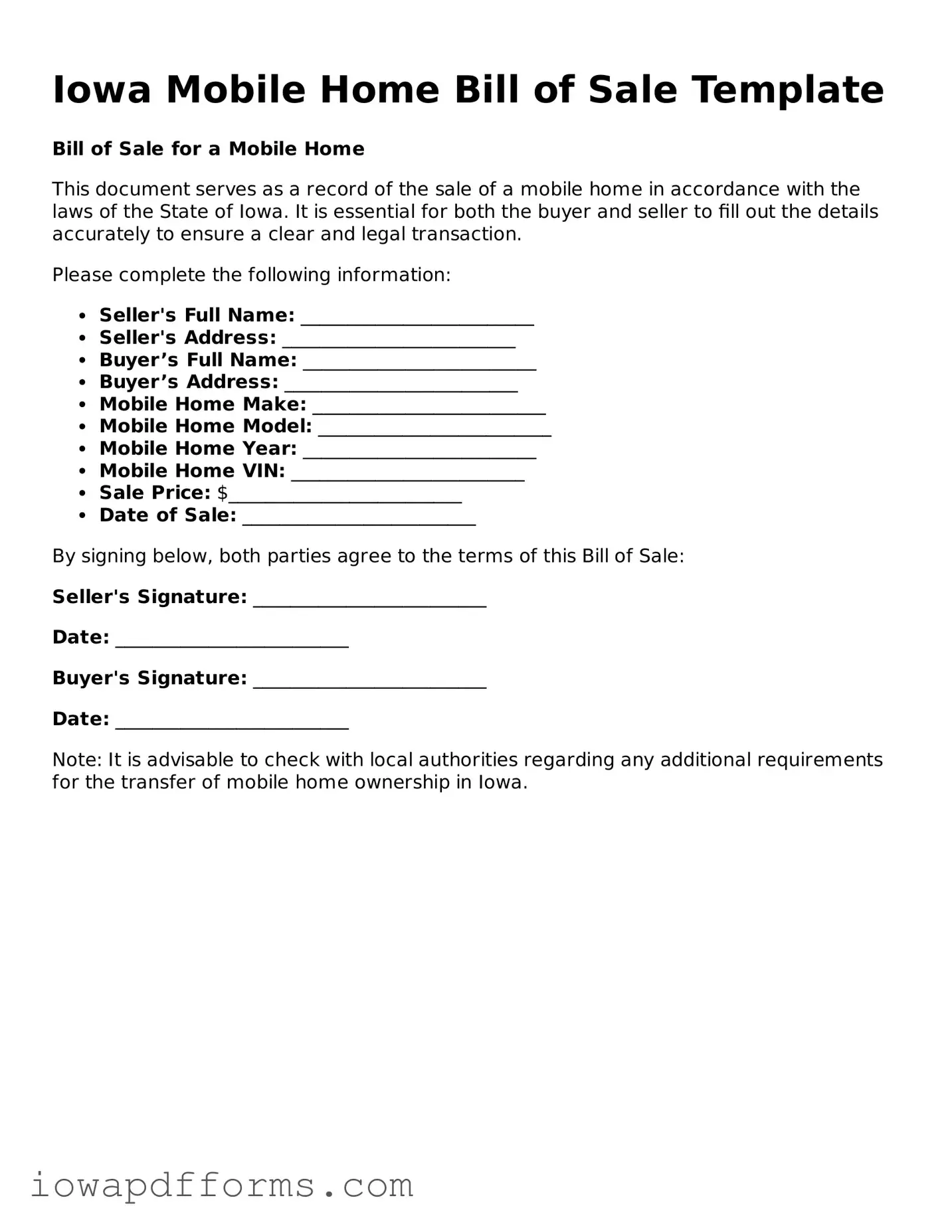The Iowa Mobile Home Bill of Sale form shares similarities with the standard Vehicle Bill of Sale. Both documents serve as proof of transfer of ownership. They typically include details such as the seller's and buyer's names, addresses, and signatures. Additionally, both forms outline specific information about the item being sold, including make, model, and identification numbers. This ensures that the transaction is documented clearly, protecting both parties involved.
Another document that resembles the Iowa Mobile Home Bill of Sale is the Boat Bill of Sale. Like the mobile home version, the Boat Bill of Sale is used to transfer ownership of a watercraft. It includes essential details such as the seller's and buyer's information, the boat's specifications, and any warranties or conditions of sale. Both documents aim to provide legal proof of the transaction and help prevent future disputes.
The Real Estate Purchase Agreement is also similar in nature. While it deals with property rather than mobile homes, it serves the same purpose of formalizing a transfer of ownership. This agreement includes critical information such as the purchase price, property description, and contingencies. Just as with the Mobile Home Bill of Sale, it requires signatures from both parties to validate the transaction.
In the realm of personal property, the Motorcycle Bill of Sale stands out as another comparable document. This form is specifically designed for the sale of motorcycles, detailing the buyer's and seller's information, the motorcycle's make and model, and any relevant identification numbers. Both the Motorcycle Bill of Sale and the Mobile Home Bill of Sale emphasize the importance of clear ownership transfer and legal documentation.
The Texas VTR 850 form plays a crucial role in preserving the legacy of classic vehicles, allowing owners to apply for unique license plates that highlight the vintage status of their cars. Much like other ownership documents, the form requires specific details about the vehicle and the owner. To learn more about how to complete this process, visit Texas Documents for additional resources and guidance.
The Lease Agreement is another document that, while serving a different purpose, shares some characteristics with the Mobile Home Bill of Sale. This agreement outlines the terms of renting or leasing a property, including duration, payment terms, and responsibilities of both parties. Like the bill of sale, it requires signatures and serves to protect the rights of both the landlord and tenant.
The Equipment Bill of Sale is also akin to the Mobile Home Bill of Sale. This document is used for the sale of heavy machinery or equipment, detailing the specifics of the item, the transaction price, and the parties involved. Both documents aim to provide a clear record of ownership transfer, ensuring that both the seller and buyer have legal protection in their transaction.
Similar to the Mobile Home Bill of Sale, the Animal Bill of Sale is used for the transfer of ownership of pets or livestock. This document includes details about the animal, such as breed, age, and health status, along with the seller's and buyer's information. Both documents serve to formalize the transaction, offering legal protection and clarity for both parties.
The Business Asset Bill of Sale is another relevant document. This form is used when selling business assets, such as equipment, inventory, or goodwill. It includes detailed descriptions of the assets being sold, the purchase price, and the parties involved. Like the Mobile Home Bill of Sale, it aims to provide a clear record of the transaction and protect the interests of both the buyer and seller.
Finally, the Pawn Ticket can be compared to the Mobile Home Bill of Sale in terms of documenting a transaction. While a pawn ticket is used for secured loans involving personal property, it includes details about the item, the loan amount, and the terms of the agreement. Both documents serve to establish ownership and outline the terms of the transaction, ensuring that both parties are aware of their rights and obligations.

